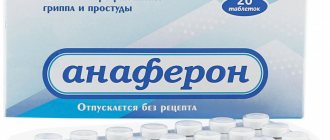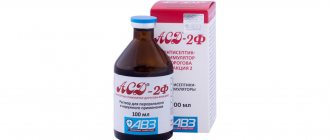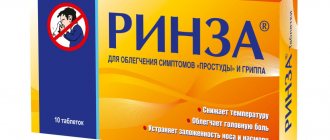Pharmacodynamics and pharmacokinetics
This combined agent exhibits a high antitussive and bronchodilator effect. Its action is determined by its constituent components.
Glaucine hydrobromide is able to suppress the cough center without causing respiratory depression , drug dependence , the development of constipation and other undesirable effects.
Taking ephedrine leads to dilation of the bronchi, helps stimulate breathing, exhibiting a vasoconstrictor effect, which helps eliminate swelling of the mucous membranes of the bronchi.
Basil oil has some sedative, antimicrobial and antispasmodic effects.
Once in the body, the drug undergoes good absorption from the gastrointestinal tract, showing maximum effect after 1.5 hours. The metabolic takes place mainly in the liver, and is excreted from the body in urine.
Pharmacological properties of the drug Bronholitin
Pharmacodynamics . A combined drug with antitussive, bronchodilator and bronchoseptic effects. The complex effect of the drug is due to the properties of its main components: glaucine hydrobromide and ephedrine hydrochloride. Glaucine hydrobromide inhibits the cough center without having a depressing effect on the respiratory center. It has a mild analgesic, bronchospasmolytic and anti-inflammatory effect. Ephedrine is a mixed-action sympathomimetic that excites α- and β-adrenergic receptors and causes the release of norepinephrine from the depot. Moderately inhibits MAO activity. Reduces swelling of the bronchial mucosa, causes constriction of arterioles and increases blood pressure; improves atrioventricular conduction; enhances cardiac activity. Activates excitation processes in the central nervous system and stimulates the respiratory center. Experimental pharmacological studies of the action of Broncholitin syrup show that it reduces the spastic effect of histamine on the bronchi. Two main components act on the cardiovascular system - ephedrine and glaucine, which exhibit the opposite effect. Ephedrine increases heart rate and blood pressure, and glaucine reduces the value of both indicators. Facilitation of sputum production and reduction of bronchial obstruction are due to the bronchodilator effect of ephedrine. Pharmacokinetics. When administered orally, glaucine hydrobromide is rapidly absorbed from the gastrointestinal tract. The time to reach the maximum level in blood plasma is about 1.5 hours after administration. Metabolized in the liver and excreted primarily in the urine. Ephedrine hydrochloride is well absorbed from the gastrointestinal tract. The half-life is 3–6 hours. It is eliminated in the urine mainly unchanged.
Indications for use
The drug Bronholitin is a cough syrup, which is recommended for use as part of complex therapy for diseases of the respiratory system accompanied by dry cough , for example, with:
- acute inflammation of the upper respiratory tract;
- tracheobronchitis;
- acute and chronic forms of bronchitis;
- bronchial asthma;
- pneumonia;
- bronchiectasis;
- whooping cough
Bronholitin syrup 125g No. 1
Name
Bronholitin syrup in bottle 125g in pack No. 1
Description
Broncholithin syrup is a combination drug that suppresses cough and dilates the bronchi. It is used in the complex treatment of inflammatory diseases of the respiratory tract, accompanied by a dry cough.
special instructions
Do not use Bronholitin:
- if you are allergic (hypersensitivity) to the active substances or to any of the excipients of Broncholithin syrup;
- if you have coronary heart disease, high blood pressure, severe organic heart disease with manifestations of decompensation, increased thyroid function (thyrotoxicosis), pheochromocytoma, increased intraocular pressure (angle-closure glaucoma), enlarged prostate gland with urinary retention, insomnia;
- in children under 3 years of age;
- if you are pregnant (first three months) or breastfeeding, the use of Broncholitin is contraindicated; It is also not recommended to take this drug during subsequent stages of pregnancy, since the ephedrine contained in the composition can cause rapid heartbeat in the fetus;
- if you have a disorder in the absorption of sugars (congenital fructose intolerance, glucose/galactose malabsorption syndrome or sucrase/isomaltase deficiency).
Precautionary measures
- Before starting treatment with Bronholitin syrup, consult your doctor if you have heart disease, heart rhythm disturbances, angina pectoris or high blood pressure. In case of labile blood pressure (increase or decrease) while taking Broncholitin, a doctor's consultation is necessary.
- It is important for athletes to know that due to the ephedrine content of the drug, a positive doping test is possible.
- Due to its weak stimulating effect on the central nervous system and possible sleep disturbance, Broncholitin syrup should not be used after 16 hours.
- Use with caution in patients prone to developing drug dependence. With long-term use of ephedrine, the development of tolerance and dependence has been observed.
- Children and older people are more sensitive to the effects of ephedrine.
- Medicines containing glaucine hydrobromide should not be used for productive cough with sputum production, since there is a risk of bronchial obstruction due to retention of bronchial secretions.
- Herbal tonic drinks (coffee, tea, Coca-Cola) can enhance the stimulating effects of Broncholitin on the central nervous system.
Interaction with other drugs
Concomitant use with drugs that increase heart function (cardiac glycosides), quinidine, general anesthetics (halothane), drugs against depression (tricyclic antidepressants, MAO inhibitors), stimulants of the nervous system, including tonic drinks (coffee, tea, Coca-Cola) increases the risk of heart rhythm disturbances or high blood pressure. If you have been taking medications to treat depression (MAO inhibitors), you can start treatment with Broncholitin syrup 2 weeks after you stop taking them. Similar effects can be observed when used concomitantly with drugs for the treatment of migraine containing ergoalkaloids or with oxytocin. Concomitant use of ergotamine is not recommended (risk of gangrene). Broncholithin should not be taken simultaneously with drugs that suppress cough, either centrally (codeine, dextromethorphan) or peripherally (libexin). Combination with drugs that lead to a decrease in bronchial secretion (for example, atropine derivatives) is not justified. Ephedrine has been shown to alter the metabolism of dexamethasone (a glucocorticoid), and coadministration is not recommended. The simultaneous administration of ephedrine with theophylline (a bronchodilator) may lead to an increase in nausea, nervousness and insomnia. Sympathomimetics reduce the antihypertensive effect of alpha- and beta-blockers (propranolol, atenolol, metoprolol), and may also affect the effect of other antihypertensive drugs. When treated together with Broncholitin and oral antidiabetic drugs, their hypoglycemic effect (lowering blood sugar levels) may be reduced. Other central nervous system (CNS) stimulating drugs, when used concomitantly, may enhance the stimulating effects of Broncholitin on the central nervous system.
Use during pregnancy and lactation
Broncholitin is contraindicated in the first trimester of pregnancy and during breastfeeding. Use in the second and third trimesters of pregnancy is not recommended. Ephedrine crosses the placenta, which may increase the fetal heart rate.
Driving vehicles and working with machines
Due to the possible occurrence of dizziness and visual impairment, caution should be exercised when performing work that requires increased attention and speed of psychomotor reactions, including when driving a car and working with machinery.
Important information about some of the ingredients
Broncholithin syrup contains up to 1.7 vol.% ethanol (alcohol). A dose of 5 ml of syrup contains up to 69 mg of alcohol. The drug is harmful for patients suffering from alcoholism. Alcohol content should be considered when used in pregnant and breastfeeding women, children and high-risk groups such as patients with liver disease or epilepsy. The drug contains 43.75 g of sucrose. When using the recommended dose, up to 2 g of sucrose enters the body with each 5 ml dose. If you are intolerant to certain sugars, Broncholitin is not suitable for you (see section “Do not use Broncholitin”). Methyl and propyl parahydroxybenzoate may cause allergic reactions (possibly delayed).
Directions for use and doses
Take the syrup orally after meals. The usual dose is: Adults and children over 10 years of age: 10 ml 3-4 times a day. Children from 3 to 10 years: 5 ml 3 times a day. Duration of treatment: 5-7 days. If symptoms continue after the 5th day of treatment or your condition worsens, contact your doctor! If you take more than the recommended dose If you take more than the recommended dose, you may experience nervous agitation, trembling, increased sweating, difficulty urinating, nausea, insomnia, and in some cases lethargy and drowsiness. Consult your doctor immediately. If you miss a dose If you miss one dose, take it as soon as possible. If it is almost time for your next dose, take it as usual, skipping the forgotten dose. Do not take a double dose to make up for a missed dose. If you have any further questions about using this medicine, ask your doctor or pharmacist.
Side effect
When treating with Bronholitin syrup, you can experience dry mouth, loss of appetite, nausea, vomiting, constipation, hypersensitivity reactions (rash, itching, urticaria, angioedema, bronchospasm), increased sweating, dizziness, trembling, tension, insomnia, anxiety, sedative effect, increased heart rate and irregular heartbeat, palpitations, conduction disorders (blockades of the heart's pathways), chest pain, increased blood pressure, poor circulation in the extremities, blurred vision, difficulty urinating or urinary retention in patients with an enlarged prostate gland, shortness of breath, addiction , increased libido, dysmenorrhea (menstrual disorder). Some patients may experience chest pain (due to cardiac problems such as angina), although the exact incidence of this adverse reaction is not known. In this case, you should consult your doctor. If any of the above symptoms (or any other adverse reactions not listed in this section) appear or worsen during treatment, stop taking the medicine and notify your doctor. The possibility of continuing to take Bronholitin is determined by the doctor.
Storage conditions
In the original packaging at a temperature not exceeding 25°C in a place protected from light. The syrup can be used up to 1 month after opening the bottle. Keep out of the reach of children. The medicine should not be used after the expiration date indicated on the packaging. Medicines should not be disposed of in a sewer or household waste container. Ask your pharmacist how to dispose of medicines you no longer need. These measures will contribute to environmental protection.
Conditions for dispensing from a pharmacy chain
On prescription.
Compound
5 ml of syrup contains: Active substances: glaucine hydrobromide 5.75 mg and ephedrine hydrochloride 4.6 mg. Excipients: ethanol 1.7% vol., sucrose, methyl parahydroxybenzoate, propyl parahydroxybenzoate, basil oil, polysorbate, citric acid monohydrate, purified water.
Contraindications
Taking the drug is contraindicated if:
- arterial hypertension;
- IHD;
- severe forms of organic heart disease;
- pheochromocytoma;
- heart failure;
- thyrotoxicosis;
- early pregnancy ;
- insomnia;
- prostatic hyperplasia , which is accompanied by clinical manifestations;
- lactation;
- patients aged less than 3 years;
- angle-closure glaucoma;
- sensitivity to the drug.
Caution is necessary if you are prone to drug addiction. Since the drug contains ethanol, caution is required when prescribing to children, patients with liver disease, epilepsy, chronic alcoholism, and brain disorders.
Bronholitin 125g syrup
Release form
Syrup in the form of a viscous liquid, from light yellow to yellow-green or light brown in color, from transparent to slightly opalescent, with a specific odor of basil oil. 125 g - dark glass bottles (1) complete with a measuring spoon or cup - packs cardboard. 125 g - bottles made of dark polyethylene terephthalate (1) complete with a measuring spoon or cup - cardboard packs.
Compound
5 g glaucine hydrobromide 5 mg ephedrine hydrochloride 4 mg Excipients: anhydrous citric acid, basil oil, ethanol 96% (1.7 vol.%), sucrose, methyl parahydroxybenzoate (nipagin), propyl parahydroxybenzoate (nipazole), polysorbate 80, purified water.
Clinical and pharmacological group:
A drug with antitussive and bronchodilator effects. Broncholitin is a combination drug containing glaucine hydrobromide, ephedrine hydrochloride and basil (oregano) oil. Bronholitin has a complex therapeutic effect: it has an antitussive effect, inhibiting the cough center in the central nervous system without respiratory depression; relieves bronchospasm, reduces bronchial secretion, due to the oil of oregano included in its composition, it has an antispasmodic, secretolytic, mild antiseptic and sedative effect; effective in treating cough of various etiologies. Can be used either alone or in combination with antibiotics and anti-inflammatory drugs.
pharmachologic effect
A combined drug with antitussive and bronchodilator effects. Glaucine hydrobromide suppresses the cough center without leading to respiratory depression, constipation or drug dependence. Ephedrine dilates the bronchi, stimulates breathing and, due to its vasoconstrictor effect, eliminates swelling of the bronchial mucosa. Basil oil has a slight sedative, antimicrobial and antispasmodic effect.
Pharmacokinetics
Suction. After oral administration, glaucine hydrobromide and ephedrine hydrochloride are quickly and well absorbed from the gastrointestinal tract. Cmax of glaucine is reached after 1.5 hours. Metabolism and excretion. Glaucine hydrobromide is metabolized in the liver and excreted primarily in the urine. Ephedrine hydrochloride is excreted unchanged in the urine. T1/2 is 3-6 hours.
Indications for use:
acute and chronic bronchitis and tracheobronchitis, bronchial asthma, COPD, pneumonia, bronchiectasis and lung abscess, pulmonary tuberculosis, pneumosclerosis and pneumoconiosis, influenza, whooping cough, etc.
Contraindications:
hypersensitivity to the components of the drug, atherosclerosis of the coronary arteries, angina pectoris, hyperthyroidism.
Side effects:
From the cardiovascular system: tachycardia, extrasystole, increased blood pressure. From the side of the central nervous system: tremor, agitation, insomnia, dizziness, in children - drowsiness. From the senses: visual impairment. From the digestive system: nausea, vomiting, anorexia, constipation. From the endocrine system: increased libido, dysmenorrhea. From the urinary system: difficulty urinating, urinary retention in patients with prostatic hyperplasia. Dermatological reactions: rash, increased sweating. Other: tachyphylaxis.
Contraindications
arterial hypertension; - IHD; - severe organic heart disease; - heart failure; - pheochromocytoma; - thyrotoxicosis; - insomnia; - angle-closure glaucoma; — prostatic hyperplasia with clinical manifestations; - thyrotoxicosis; — I trimester of pregnancy; - lactation period (breastfeeding); - children under 3 years of age; - hypersensitivity to the components of the drug. Bronholitin should be prescribed with caution to patients with a tendency to develop drug dependence. Due to the ethanol content, caution should be exercised when prescribing the drug in childhood, in patients with liver disease, chronic alcoholism, epilepsy, brain diseases, and during pregnancy.
Use of the drug during pregnancy and lactation
The drug is contraindicated for use in the first trimester of pregnancy and during lactation (breastfeeding). During other periods of pregnancy, the drug should be prescribed with caution. Use for liver dysfunction Bronholitin should be prescribed with caution to patients with liver disease.
special instructions
When using the drug Bronholitin, it is necessary to take into account that 1 measuring spoon or 1 glass (5 ml) contains up to 0.069 g of ethanol 96% (1.7 vol.%). Influence on the ability to drive vehicles and operate machinery. Due to the possible occurrence of dizziness and visual impairment, caution should be exercised when performing work that requires increased attention and speed of psychomotor reactions, incl. when driving a car and working with machinery.
Overdose
Symptoms: nausea, vomiting, loss of appetite, agitation, poor circulation, tremors of the limbs, dizziness, sweating, difficulty urinating. Treatment: gastric lavage, symptomatic therapy.
Drug interactions
Bronholitin can be used simultaneously with antibiotics, antipyretics and vitamins. Ephedrine, which is part of the drug, weakens the effect of opioid analgesics and hypnotics. When using ephedrine simultaneously with cardiac glycosides, quinidine, and tricyclic antidepressants, the risk of developing arrhythmias increases. With the simultaneous use of ephedrine with reserpine and MAO inhibitors, a sharp increase in blood pressure is possible. With simultaneous use of ephedrine with non-selective beta-blockers, the bronchodilator effect may be reduced. There is no data on drug interactions between glaucine and other drugs.
Conditions for dispensing from pharmacies
The drug is available with a prescription.
Storage conditions and periods
The drug should be stored in a dry place, protected from light, out of the reach of children, at a temperature not exceeding 25°C; do not freeze.
Shelf life - 4 years
Side effects
When treated with Bronholitin, side effects may occur that affect the functioning of the cardiovascular, nervous, digestive, endocrine, urinary and other systems. In this case, undesirable effects often occur in the form of: tachycardia, extrasystole , increased blood pressure , tremor , agitation, insomnia , dizziness , nausea , vomiting, anorexia , constipation , increased libido, dysmenorrhea , difficulty urinating and others.
It is also possible that vision impairment, the development of dermatological reactions, tachyphylaxis , and so on.
Side effects of the drug Broncholitin
from the cardiovascular system - tachycardia, extrasystole, hypertension (arterial hypertension); from the central nervous system - tremor, agitation, insomnia, dizziness; from the gastrointestinal tract - nausea, vomiting, anorexia, constipation; from the endocrine glands - increased libido, dysmenorrhea; from the urinary system - difficulty urinating, urinary retention in patients with prostate hypertrophy; skin and mucous membranes - skin rash, increased sweating; others - visual impairment, tachyphylaxis, allergic reactions. Ephedrine may cause drowsiness in children. The drug can be used by car drivers and people whose work requires a high speed of mental and physical reactions.
Bronholitin syrup, instructions for use (Method and dosage)
This drug is intended to be taken orally after eating. As the instructions for use of Broncholitin for children indicate, it can be used from 3 years of age.
In this case, the daily dosage for children 3-10 years old is 5 ml for 3 times a day. For adult patients and children over 10 years of age, the instructions recommend taking the syrup in a daily dosage of 10 ml 3-4 times.
The duration of therapy is on average 5-7 days, and reviews for children show that this time is quite enough for a complete recovery.
About the drug Bronholitin
The most common symptom of most lung and respiratory diseases is a cough.
This reaction of the body is a protective reflex that helps the bronchi cope with irritation and get rid of painful discharge.
The cough can be dry, wet, paroxysmal, hysterical, muffled. In any case, this phenomenon causes a lot of trouble for the sick person. For each type of cough there is a specific group of medications. Currently, especially in the autumn-winter period, Bronholitin is very popular among the population. Instructions for use characterize this medication as a bronchodilator antitussive drug of combined action. The medicine is available in syrup form, which is very convenient, especially for treating children. The drug contains three active ingredients: basil oil, ephedrine hydrochloride and glaucine hydrobromide.
Dosage regimen For dry, exhausting cough, adults and children over 10 years of age take Bronholitin syrup three times a day, 10 milliliters. Children 3 to 10 years old are prescribed 5 milliliters in the morning, afternoon and evening. In severe cases, additional syrup may be taken before bedtime.
Contraindications Despite the high effect, Bronholitin has a number of contraindications that must be taken into account. It is not recommended to use this drug for diseases of the cardiovascular system: arterial hypertension, heart failure, coronary heart disease. This medication should not be taken if you have prostatic hyperplasia, thyrotoxicosis, or insomnia. It is strictly contraindicated to use the medication for angle-closure glaucoma. Bronholitin should be avoided if you are hypersensitive to its ingredients. Do not use the drug in the first trimester of pregnancy and when breastfeeding a newborn. You will need to choose another medicine, or use folk remedies, if a strong cough torments a small child under 3 years of age.
Side effects You should also take into account the fairly wide list of side effects that Bronholitin can cause. Instructions for use indicate the following negative manifestations: nausea, vomiting, constipation, increased blood pressure, extrasystole, tachycardia, blurred vision, dysmenorrhea. The central nervous system may respond with dizziness, insomnia, excessive agitation, and tremors (shaking) of the limbs. Sometimes allergic reactions occur in the form of skin rashes. People with prostatic hyperplasia may experience urinary retention.
Interaction
This drug contains ephedrine, which can reduce the effectiveness of hypnotics and opioid analgesics.
Concomitant use with cardiac glycosides, tricyclic antidepressants and Quinidine can lead to the development of arrhythmias .
Combination with Reserpine or MAO inhibitors significantly increases blood pressure, and with non-selective beta-blockers reduces the bronchodilator effect of the drug.
Special instructions for the use of the drug Broncholitin
Bronholitin contains up to 1.7 vol.% ethanol. Each dose (1 scoop) contains up to 0.069 g of alcohol. This can be dangerous for patients with alcoholism, epilepsy, patients with liver disease, brain damage or disease, as well as for pregnant women and children. This medicine may change or enhance the effects of another medicine. Excipients may lead to allergic reactions. The drug should be used with caution when driving vehicles or operating machinery due to the possibility of dizziness and visual impairment.
special instructions
You should know that one measuring spoon or glass, the volume of which is 5 ml, contains about 0.069 g of 96% ethanol.
When driving vehicles and operating machinery, dizziness may occur and vision may be impaired, so you need to be careful when performing work that requires high attention and quick psychomotor reactions.
Treatment of patients with impaired liver function also requires extreme caution when choosing a therapeutic regimen and course duration.
Instructions for use BRONCHOLYTIN
Due to the stimulating effect on the central nervous system and possible sleep disturbance, it is not recommended to take Broncholitin after 16:00.
Patients prone to developing drug dependence should use the drug with caution.
If symptoms do not disappear after 5-7 days after starting treatment or the condition worsens, treatment should be reconsidered.
Due to the ephedrine content in the drug, a positive doping test in athletes is possible.
Cardiovascular effects may be observed during treatment with sympathomimetics, including Broncholithin. There is known evidence from post-marketing studies and published literature of rare cases of myocardial ischemia associated with the use of beta-agonists (ephedrine hydrochloride). Patients with heart disease (coronary artery disease, arrhythmia, or heart failure) who are using this drug should be warned to seek medical attention if chest pain or other symptoms of worsening heart disease occur. Particular attention should be paid to assessing symptoms such as dyspnea and chest pain, as they can be of either respiratory or cardiac origin.
Bronholitin contains up to 1.7 vol.% ethanol. A dose of 5 ml of syrup contains up to 69 mg of alcohol. Therefore, the drug is harmful for patients suffering from alcoholism. Alcohol content should be considered when used in pregnant and breastfeeding women, children and high-risk groups such as patients with liver disease or epilepsy.
The drug contains 43.75 g of sucrose. When used in the recommended dose, up to 2 g of sucrose enters the body with each 5 ml dose. The drug is not suitable for patients with impaired absorption of sugars (congenital fructose intolerance, glucose/galactose malabsorption syndrome or sucrase/isomaltase deficiency).
The syrup contains methyl and propyl parahydroxybenzoate as excipients, which can cause allergic reactions (possibly delayed).
Impact on the ability to drive vehicles and operate machinery
Broncholithin syrup has a small to moderate effect on the ability to drive vehicles and operate machines. Ephedrine can cause mydriasis and affect driving.
Preclinical safety data
The LD50 of Broncholithin when administered orally in mice is 50 ml/kg, and in rats - 20 ml/kg.
Research gives grounds to classify Bronholitin as a drug with mild toxicity.
There was no evidence of the mutagenic effect of Broncholitin when tested using the Ames test. There is no data on embryotoxicity and teratogenicity in the laboratory animals studied.
Broncholitin analogs
Level 4 ATC code matches:
Bronchoton
Pectolvan Stop
Glycodin
The main analogues of Broncholitin, similar in mechanism of action: Bronchocin, Broncholin sage, Bronchoton, Codipront, Tussin Plus, Tedein, Alex Plus, Tercodin, Glycodin . If the patient has a problem, what to replace the drug with is better to discuss this with the attending physician.
Bronholitin for weight loss
Quite often, this drug is taken by women who want to quickly and completely lose weight. In this case, a special scheme for weight loss is used, including: Caffeine , Broncholithin, Aspirin , which are taken in certain dosages.
Reviews about this method of losing weight vary and are not always positive. For many people, this results in serious health problems, but this stops few people. Also, regimens using this drug are used in bodybuilding, when it is necessary to influence the development of muscle mass and body structure.
Reviews about Bronholitin
In most cases, reviews about Broncholitin are found on medical forums, but users also leave opinions about this drug on other resources. However, they are not always related to its intended use.
Unfortunately, many reports concern how to obtain ephedrine for use as a narcotic substance. There are also many schemes for using the drug in combination with other drugs.
It is not surprising that all this causes a storm of indignation. Many users sincerely do not understand how they can buy this highly effective drug, which helps patients with bronchial asthma , only to knock out the ephedrine and use it for other purposes. Usually such experiments end in serious complications. As a result, the health of the liver and kidneys, cardiovascular and other body systems suffers.
You can also find reviews of Broncholitin for children, when this drug was used in the treatment of bronchial asthma, obstructive bronchitis and other diseases. The treatment usually goes well, but some mothers are interested in whether Bronholitin is available in pharmacies by prescription or not? As you know, it is almost impossible to buy this drug without a prescription. Moreover, syrup is not at all easy to purchase in pharmacies, even with a prescription, so some patients prefer tablets, which are more affordable.
Thus, reports regarding the use of the drug according to its indications indicate its high effectiveness. Cases of side effects have not been described. But still, it is not recommended to take this medicine without a doctor’s prescription.
Interactions of the drug Broncholitin
Bronholitin can be prescribed simultaneously with antibiotics and other antimicrobials, antipyretics and vitamins. Considering the properties of the active substance - ephedrine - it is necessary to take into account its drug interactions:
- with guanitidine - displacing it from binding to α-adrenergic neurons and enhancing its direct α-adrenomimetic effect;
- with reserpine - a decrease in the effect of ephedrine due to depletion of norepinephrine depots;
- with tricyclic antidepressants - increased pressor effects of direct and indirect action sympathomimetics due to blocking the accumulation of catecholamines in adrenergic nerve endings;
- with propranolol - a decrease in the bronchodilator effect of ephedrine.
Ephedrine is an antagonist of non-narcotic analgesics and drugs that inhibit the central nervous system. There are no known adverse interactions of glaucine with other drugs.
Bronholitin price, where to buy
The price of syrup in Russian pharmacies starts from 95 rubles. You can also buy Bronholitin with delivery, after finding out how much the drug costs by phone or on the company’s website.
The price of Bronholitin in Ukraine varies between 60-70 UAH.
- Online pharmacies in RussiaRussia
- Online pharmacies in UkraineUkraine
- Online pharmacies in KazakhstanKazakhstan
Pharmacy Dialogue
- Bronholitin (vial 125g) Sopharma
186 RUR order
show more
Pharmacy24
- Bronholitin 125 ml syrup AT "Sopharma", Bulgaria
99 UAH. order - Broncholitin 40 mg No. 20 tablets AT "Sopharma", Bulgaria
103 UAH order
PaniPharmacy
- Bronholitin liquid Bronholitin syrup 125ml Bulgaria, Sopharma
113 UAH order
- Bronholitin tablets Bronholitin tablets. 40 mg No. 20 Bulgaria, Sopharma
107 UAH order
show more




